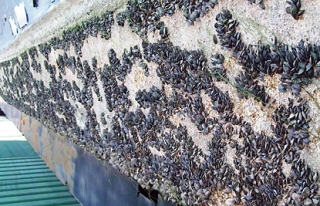The National Science Foundation (NSF) has provided funding to a team from the University of Akron The $390,000 will be used to design and assess waterproof medical adhesives made from soybean oil.
 Mussels, seen here attached to a boat, started UA researchers on an interesting path with their design of waterproof medical adhesives.
Mussels, seen here attached to a boat, started UA researchers on an interesting path with their design of waterproof medical adhesives.
Classic examples of adhesives, which work very efficiently in wet and harsh conditions, can be found throughout nature. For instance, mussels are capable of sticking to rocks and boats using the protein-based adhesives they secrete. The adhesives work really well even in challenging marine conditions.
Teams handled by Dr. Abraham Joy, an assistant professor of polymer science and Dr. Ali Dhinojwala, H.A. Morton Professor of Polymer Science drew their inspiration from the mussels to create a synthetic adhesive, which imitates the adhesives of the mussel, from soybean oil as base material. Soybean oil was selected as it is a renewable resource.
Adhesives are a multi-billion dollar industry. However, a large proportion of current adhesives in the market use petroleum-based starting materials, which is a non renewable resource. Therefore, replacing with widely available and sustainable materials such as soybean oil provides with dual advantages of an adhesive that works in aqueous conditions and a high-value medical product.
Our long term goal is to understand the molecular basis of adhesives that are effective in wet environments. The knowledge gained from such studies will provide the foundation for designing adhesives for various challenging applications — such as medical adhesives that will function in presence of body fluids.
Joy
Using the NSF funding, the team will analyze the physical and chemical processes in order to understand the reasons for the strong adhesion of this soybean oil-based adhesive in aqueous conditions.
References